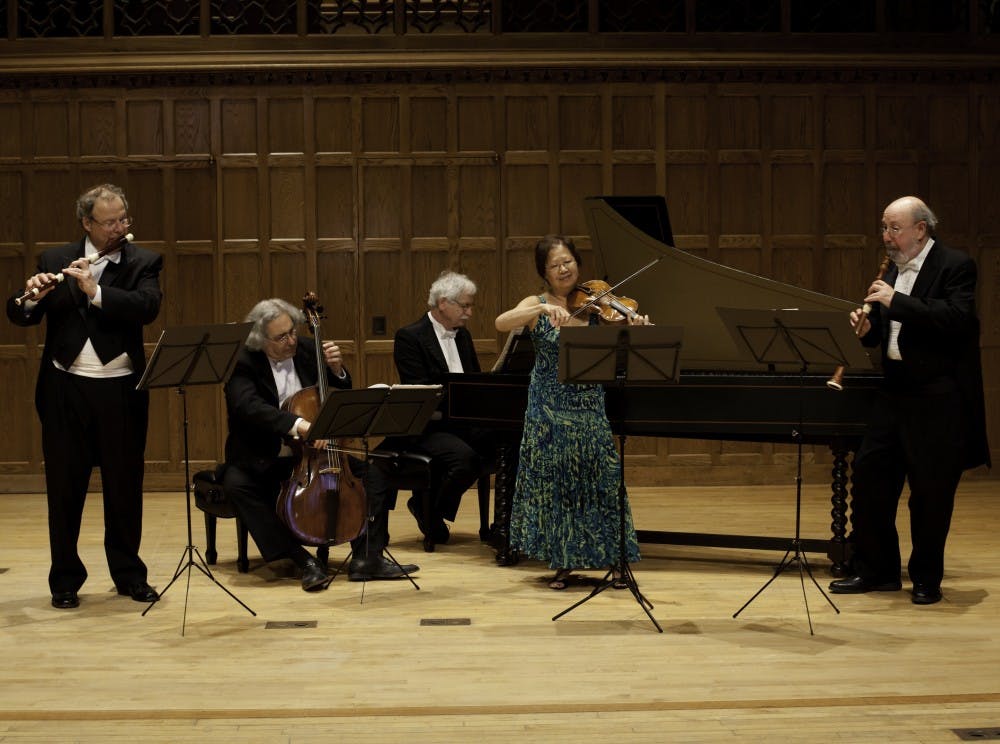Deep inside the world of classical music, there is a movement to revive instruments from an earlier time, and at the forefront of this movement is the Aulos Ensemble, who are performing at ASU's Katzin Hall on Jan. 23.
Aulos Ensemble's program includes works by baroque masters ranging from Henry Purcell to George Frideric Handel to François Couperin.
The program is called "A Tale of Two Cities," after Charles Dickens' famous novel. Despite taking its namesake from the novel, the program isn't thematically similar. In fact, the only thing it borrows are the two central settings: London and Paris, with the first half of the program being by London-based composers and the second half Parisians.
Period chamber groups are becoming more popular with musicians around the world, especially in America and Europe. Modern instruments do not have the capabilities of playing the complex timbres and frequencies of classical music from the times of Bach, Mozart, Beethoven or any pre-1900 composers.
Catherine Saucier, associate professor of musicology, alluded to period musicians as aural journeymen.
"A period ensemble is a group of musicians who perform on 'original' instruments dating roughly from the time the music was composed, or modern reconstructions, using historically informed performance practices," Saucier said. "These ensembles aim to recreate, as accurately as possible, the timbres, techniques and conventions that would have been familiar to earlier composers and their audiences, and to bring to life the original spirit of the music."
For ASU musicians, there are many opportunities to study period music. The University is home to a multitude of baroque organs and many studio professors have period instruments of their own.
"Concerts and master classes sponsored by the Phoenix Early Music Society (pems.org) are the best way for students, faculty, and the general public to experience early music at ASU," Saucier said. "PEMS sponsors, at least, one free master class each year as well as several concerts on campus, featuring leading period ensembles from North America and abroad. Students have the option of enrolling in the Baroque Ensembles (mostly on modern instruments), and some also have the opportunity to study a period instrument with the studio faculty."
The five Juilliard graduates of Aulos Ensemble will appeal to ASU's baroque scene by bringing a unique period experience to the concert hall.
Now in their 41st season, the Aulos Ensemble pioneered the period restoration movement in America, although Europeans predate Americans in this revival. Due to this, the ensemble's oboist, Marc Schachman's musical styling permeates more than just the unique sounds and instrumentations of the ensemble, but the whole movement.
"A lot of (the ensemble is) on faculties at various performing institutes and conservatories," Schachman said. "We've ended up training a lot of the younger players. In a certain sense, we are first generation players. One of the things that make our ensemble slightly different than most is the number of instruments. Right at the beginning, we chose to have nearly an equal number of strings and winds. We have a flute, an oboe, a violin, a cello and a harpsichord."
Typically, period ensembles are either all winds or, more frequently, all strings. Thus, Aulos defined themselves as a unique ensemble in period restoration. That isn't to say that there aren't opportunities for many types of musicians to engage with the past, like ASU's Joshua Pierce who is studying for his master's in guitar performance.
"What I have found truly inspirational about studying period performance is the connection with history that can be gained," Pierce wrote in an email. "As I type, I am looking at a New York Times article about fossils discovered in Patagonia of a Titanosaur; the so-far largest species of dinosaur discovered. It is very much the same for musicians as it is for paleontologists. Every day there is the potential to discover something huge in your given field of study."
Aulos Ensemble's "A Tale of Two Cities" will take place at 7:30 p.m. on Jan. 23, in Katzin Hall. Tickets range from $12 to $22, but a free masterclass will be hosted on Jan. 23 from 12 p.m. - 2 p.m. in Katzin Hall.
Related links:
ASU's Lyric Opera Theatre presents student production of the renowned "Grease"
2 is a couple, 3 is 'Company' in latest Lyric Opera production
Reach the reporter at tanner.stechnij@asu.edu or follow @tannerstechnijon Twitter.
Like The State Press on Facebook and follow @statepress on Twitter.




